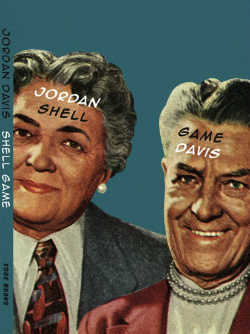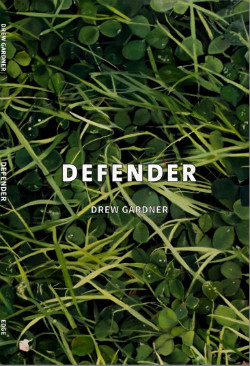Shell Game
Jordan Davis
Edge Books, 2018.
Paperback, 128 pages
Defender
Drew Gardner
Edge Books, 2018.
Paperback, 88 pages
Review by Tyrone Williams
As one might expect, this combination review may be as much about, indirectly, the publisher as it is about the two books of poetry. So let me start by saying both Shell Game and Defender are witty, often hilarious, incisive books of poetry, and though they have a sensibility in common—intersecting at a dominant nexus that centers the aesthetic, cultural and social orientation of both Aerial and Edge Books publications—the books only overlap. As demonstrated throughout the irreverent jocularity and punchy aggressiveness of Shell Game, Jordan Davis in general, has a lot in common with someone like the Canadian-born Donato Mancini: their toolboxes include clowns, memes, Gameboys, and meta-Flarf, middlebrow Conceptual Writing hijinks. On the other hand, Defender is proof perfect that Flarf—at least in Drew Gardner’s books—always had a political dimension, however obscured by its satirical, mocking and, occasionally, politically incorrect nose-thumbing. This latter dimension is evident in Gardner’s Flarf Orchestra recordings, less so in his own books. Davis’ and Gardner’s books reflect, in their own ways, both the range of Flarf and also intersects with some aspects of the poetics and philosophy of Rod Smith, legendary (I think it’s fair to say) publisher of Aerial magazine and Edge Books and owner of Bridge Street Books.1
Jordan Davis’ Shell Game is full of cranky delights and, important to add, reminders of what should, by now, be apparent. No question there is pleasure in drinking old wine from new glasses (“The questions are local/ but the answers are off the rack. The hook.”—88), but the absurd logics of many of the “subpoems” that comprise “My Orhan Veli” (Part II of the book) are more rewarding. Yes, many are, to pull in a cliché, deceptively simple (“Life could drive you crazy–/Night! Stars! The breeze/ coming off this flower-covered tree.”—50), but some are simply deceptive: “I love/ to see a new horizon/ when the building by the road’s/ in ruins.” (53) Davis’ targets and strategies certainly might not appear new, but we should never forget Derrida’s caution to his over-optimistic readers that deconstruction was an interminable process; the metaphysics of identity and presence, never destroyed in a final, violent gesture, reconstitute themselves after they are unraveled and disseminated.2 The title of Davis’ book thus operates on several levels, from personal identity to global machinations via war and finance. But at each level, in each instance, what is critiqued, deconstructed, reappears in another site, the shell game per se. The first poem of the book, “Drone,” thus takes us back to an early tenet of Language Writing: “What frees the hand/ from its patronym/ is a terrible swift word, // not a life-drawing class.” That last line, of course, is directed against a workshop model that encourages the treatment of language as a window, the objects of the world representable to the extent eye and hand dovetail at the ideal word, image or metaphor. Davis does not object to this model per se; the swift movement of his own poems depend on both their traditional stanza forms and, quite often, the seamless passage from signifier to signified. However, the next two lines of “Drone” immediately point to the hegemonic, and thus political and cultural, consequences of representation (which should be understood in all its sexual, gender, ethnic, racial and political science iterations): “How much worse than being talked about/ is it to be painted?” (3) Among other its multiple significations, this question explains why the all-purpose suffix “…while black,” like the chorus of “me too,” have become social media memes.
Still, as noted above, Davis does not exclude himself from criticism, at least not when it comes to the narrower field of poetry. Although the regular stanza form of “Otters” exemplifies the claim that “So much of poetry/ is filled with stuff/ that fills poetry…,” to say nothing of the fact that “this stuff is so often/ arranged in a way/ stuff is arranged/ in poetry,” most of the poems in this book are arranged like, well, most poetry. To his credit, Davis does not view this catch-22 as either tragic or comedic; rather, he takes a certain delight, even Keatsian joy, in the contradictions and contraries that constitute living as an American poet. As with some Flarf, however, one detects not just righteous hostility (Davis is one of our least self-righteous politically engaged poets) but also the remnants of nostalgia, the bitter mead of the satirist (the thrust of a terrible Swift word?). All kinds of jumbled feelings and thoughts explode from two of the longer poems in part I (the book has three sections), the eponymous “Shell Game” and “When I Was The Subject.” In the latter, especially, Davis explores problems of irrelevance, of love, of identity, and, yes, resentment, frustration and hostility (“My Hostility” in part III is a distilled version of some aspects of this poem). “When I Was The Subject” refers to an era—let’s call it that for the sake of convenience—before the deconstruction of identity politics (I=subject) but it also may be read as Davis referring to what it means when one (say a Flarf poet) is eclipsed by the next new thing: “New poem/ come up from/ the earth/ the south/ the minors…” (38) To put the matter bluntly, this poem worries over the possibility that Jordan Davis may be just another white male poet, full of white male angst. The context for this possibility is local—the 2005-2007 Michael Magee/ Craig Santo Perez controversy which reworked many arguments of the 1988 Ron Silliman/Leslie Scalapino debate— and national (the recent Nation controversy over a poem written by a white male poet).3 Still, this issue forecloses the question of what it might have meant, or even can one ever mean, to write as a human poet? We know too well why we cannot, today say, just a human poet. That phrase can only smack of naivete, if not outright denial, of the ways that humans have treated, and continue to treat, other humans. Davis does not take that escape route. He faces the issue head-on. Of course, when Flarf was the subject that everyone talked about, even with hostility, that may have been quite the time (no such thing as bad publicity and all that…). But what if Davis and other Flarf, or post-Flarf writers, find themselves now simply being painted? How much worse indeed…
Drew Gardner is not having any of that bullshit. Defender is a robust, unapologetic defense—by example, not (just} rhetoric—of the Flarf project. Unlike the playful, whimsical Davis, Gardner is hardcore, and yes, there’s a part of me that responds positively to the maximalist aesthetics (Flarf is also a descendant of the New York School) on display: the long lines, the equivalency between paragraphs and stanzas, the preference for parataxis and demotion of narrative, and so forth. No doubt the major pieces in this book are “Four Ronald Reagan Essays,” a tour de force through the links (as in golf) among pop culture and political icons. Each essay features sampled, and often (but not always) rearranged speeches, conversations and interviews from Reagan and a pop music (e.g., Iggy Pop) and movie (e.g., Bo Derek) star. The resulting mash-ups, Gardner essentially providing the rope for these figures to hang themselves, is not only hilarious but also disturbing since the structural relationship between popular politics (Democrat/Republican) and popular culture remains a fixture of American history. And on is hardly surprised that the following could have been uttered by everyone from Mel Gibson to the current Imposter in Power even if neither they nor Ronald Reagan actually said this: “Facts are stupid things. But they didn’t have them then, so I was kind of before my time.” (42) Of course, the proud embrace of ignorance as a kind of pure state—the Noble Savage, as it were—is an old trope. Gardner is just as wary, however, of “knowledge,” especially when it is wrapped in the glitter of progress. For Gardner, as for Kenneth Goldsmith, the expanding universe of data available on, and as, the internet displaces the Romantic genius, the recombinatory powers of the imagination. Thus, in the penultimate stanza of “In Neptune’s Kitchen,” Gardner makes this timely observation: “The new is not fashion, / it is light caught in a ridiculous skyscraper.” (53)
I noted above that Davis’ Gardner’s texts intersect at specific thematic points. In “When I Was The Subject,” Davis writes septet:
I am in love
does not function as
an emotional declarative
the way
So I was getting ready
for my father to die
does (41)
The difference in valence between these statements (the first “a state/ of looking for an object,” the second, “unarguable”) is part of the critique of identity in the poem. Here are the last five lines of the first stanza of Gardner’s poem “I’m Sorry I Showed You That”:
There are times in a man’s dream
when he comes to understand
what “I love you” really means,
cuts it up into hors d’oeuvre-sized pieces
and feeds it back to you on Arnold Schwarzenegger’s life. (21)
The difference in tone—Davis’ crying clown (the poem “Ha Ha Only Serious” walks a tightrope between self-mocking and somber “expression”), Gardner’s bah-humbug sneer—is obvious. What interests me is the way the “object” sought in Davis’ lines (“you”) appears in Gardner’s poem, provoking an attack on overwrought masculinity delivered in chewable bits. Yearning in Davis’ lines is stripped bare and exposed as self-serving condescension in Gardner’s poem. A final example of the differences between the two poets can be seen when one compares Davis’ abecedarian poem “New Words 1939-1945” to Gardner’s “The Programs.” Davis’ survey of the way neologisms pass into accepted lexicons is aesthetically pleasing and instructive, a poem so faithful to the form it would please the most hardened Horatian. Gardner’s poem starts off as though it means to also track the abecedarian form but quickly goes off kilter, throwing in W words early on and ending with “Witch hunt score, yellow stone, / Split glass.” (76) Like “New Words 1939-1945,” the pleasures of this poem meld seamlessly with its wacky “instructions,” one of which is simply that unleashed ludic drives always overpower their constraints, the Id—to go to another paradigm—subverts the Ego.
None of this implies, of course, that these two books, much less these specific poems and lines, constitute criticisms of one another. Rather these two takes on the topic of “love” and the abecedarian imply two divergent sensibilities or, to put it into a category pertinent to the adventures of Flarf, demonstrate the discursive poles of naïveté and cynicism underpinning avant-garde practices.4 Both tendencies, evident in both Shell Game and Defender, propel avant-garde art toward the horizon of a world realized otherwise.
Footnotes
1. Smith’s deadpan delivery of his own sarcastic, self-mocking, and politically engaged poetry predated, or more accurately, developed alongside Flarf. In this respect his early work (Fear the Sky, from 2005, is a classic) situated itself between, as it were, Gary Sullivan’s early writings that Sullivan belatedly labelled Flarf and Drew Gardner’s contribution to the movement: sampling the Internet (which rap artists had been doing since “Rapper’s Delight,” though sampling is older than rap). Smith’s trajectory includes a direct, and acknowledged, engagement with Language Writing, though his writing oriented itself toward the more playful side of that movement—Bernstein, say, rather than Watten. At any rate, Smith’s aesthetic and cultural predilections are reflected, I think, in his various work sites: the bookstore as social engagement and cultural labor, the magazine as showcase for both influences (on Smith and a larger poetry reading community) and trends, and the book publishing venture as support for both Flarf and non-Flarf writers, largely skewed toward the West (L.A more than the Bay Area) and East (the Corridor) coasts. Despite some recent health issues, Smith remains at the helm of these institutions and the poetry world in general, whatever one’s particular interest—or non-interest—in Flarf (or post Language Writing), is all the richer for that.
2. The normative translation of Heidegger’s Destruktion as deconstruction, not destruction, was necessary to prevent confusion even though Heideggerean “destruction” is semantically equivalent to Derridean deconstruction.
3. Perez’s summary of the issues can be found at jacket2, while Watten’s summary of the Scalapino/ Silliman exchange can be found in “Leslie Scalapino and Ron Silliman, What/Person: From An Exchange,” A Guide to Poetics, 378-92. One of many summaries of The Nation poem controversy can be found here.
4. I have in mind some of the ideas around resistance and commodification explored in a series of short essays by the Italian Marxist Edoardo Sanguineti. See his “Essays on the Avant-Garde,” translated by Joel Calahan in Lana Turner 6, 107-122.

Tyrone Williams teaches literature and theory at Xavier University in Cincinnati, Ohio. He is the author of several chapbooks and six books of poetry: c.c., On Spec, The Hero Project of the Century, Adventures of Pi, Howell and As Iz. A limited-edition art project, Trump l’oeil, was published by Hostile Books in 2017. He and Jeanne Heuving edited the anthology, Inciting Poetics (2019). His website is here.

